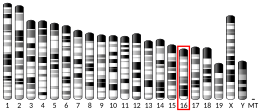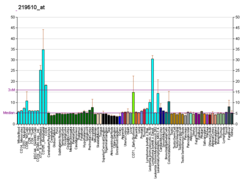Our website is made possible by displaying online advertisements to our visitors.
Please consider supporting us by disabling your ad blocker.
POLQ
DNA polymerase theta is an enzyme that in humans is encoded by the POLQ gene.[5][6] This polymerase plays a key role in one of the three major double strand break repair pathways: theta-mediated end joining (TMEJ).[7][8][9][10] Most double-strand breaks are repaired by non-homologous end joining (NHEJ) or homology directed repair (HDR). However, in some contexts, NHEJ and HR are insufficient and TMEJ is the only solution to repair the break.[11] TMEJ is often described as alternative NHEJ, but differs in that it lacks a requirement for the Ku heterodimer, and it can only act on resected DNA ends.[12] Following annealing of short (i.e., a few nucleotides) regions on the DNA overhangs, DNA polymerase theta catalyzes template-dependent DNA synthesis across the broken ends, stabilizing the paired structure.[13][14]
- ^ a b c GRCh38: Ensembl release 89: ENSG00000051341 – Ensembl, May 2017
- ^ a b c GRCm38: Ensembl release 89: ENSMUSG00000034206 – Ensembl, May 2017
- ^ "Human PubMed Reference:". National Center for Biotechnology Information, U.S. National Library of Medicine.
- ^ "Mouse PubMed Reference:". National Center for Biotechnology Information, U.S. National Library of Medicine.
- ^ Sharief FS, Vojta PJ, Ropp PA, Copeland WC (July 1999). "Cloning and chromosomal mapping of the human DNA polymerase theta (POLQ), the eighth human DNA polymerase". Genomics. 59 (1): 90–6. doi:10.1006/geno.1999.5843. PMID 10395804.
- ^ "Entrez Gene: POLQ polymerase (DNA directed), theta".
- ^ Chan SH, Yu AM, McVey M (July 2010). "Dual roles for DNA polymerase theta in alternative end-joining repair of double-strand breaks in Drosophila". PLOS Genetics. 6 (7): e1001005. doi:10.1371/journal.pgen.1001005. PMC 2895639. PMID 20617203.
- ^ Yu AM, McVey M (September 2010). "Synthesis-dependent microhomology-mediated end joining accounts for multiple types of repair junctions". Nucleic Acids Research. 38 (17): 5706–17. doi:10.1093/nar/gkq379. PMC 2943611. PMID 20460465.
- ^ Koole W, van Schendel R, Karambelas AE, van Heteren JT, Okihara KL, Tijsterman M (2014-02-05). "A Polymerase Theta-dependent repair pathway suppresses extensive genomic instability at endogenous G4 DNA sites". Nature Communications. 5 (1): 3216. Bibcode:2014NatCo...5.3216K. doi:10.1038/ncomms4216. PMID 24496117.
- ^ Roerink SF, van Schendel R, Tijsterman M (June 2014). "Polymerase theta-mediated end joining of replication-associated DNA breaks in C. elegans". Genome Research. 24 (6): 954–62. doi:10.1101/gr.170431.113. PMC 4032859. PMID 24614976.
- ^ Schimmel J, van Schendel R, den Dunnen JT, Tijsterman M (September 2019). "Templated Insertions: A Smoking Gun for Polymerase Theta-Mediated End Joining". Trends in Genetics. 35 (9): 632–644. doi:10.1016/j.tig.2019.06.001. PMID 31296341. S2CID 195892718.
- ^ Yousefzadeh MJ, Wyatt DW, Takata K, Mu Y, Hensley SC, Tomida J, et al. (October 2014). "Mechanism of suppression of chromosomal instability by DNA polymerase POLQ". PLOS Genetics. 10 (10): e1004654. doi:10.1371/journal.pgen.1004654. PMC 4183433. PMID 25275444.
- ^ Mateos-Gomez PA, Gong F, Nair N, Miller KM, Lazzerini-Denchi E, Sfeir A (February 2015). "Mammalian polymerase θ promotes alternative NHEJ and suppresses recombination". Nature. 518 (7538): 254–7. Bibcode:2015Natur.518..254M. doi:10.1038/nature14157. PMC 4718306. PMID 25642960.
- ^ Ceccaldi R, Liu JC, Amunugama R, Hajdu I, Primack B, Petalcorin MI, et al. (February 2015). "Homologous-recombination-deficient tumours are dependent on Polθ-mediated repair". Nature. 518 (7538): 258–62. Bibcode:2015Natur.518..258C. doi:10.1038/nature14184. PMC 4415602. PMID 25642963.
Previous Page Next Page







